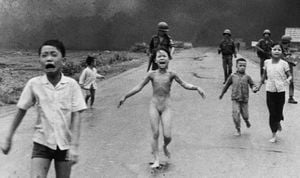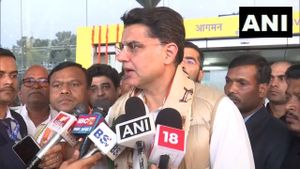Marcin Mastalerek, Chief of Staff to President Andrzej Duda, has provided an insightful perspective on the current political situation of the ruling Law and Justice (PiS) party following their defeat to the opposition. Mastalerek's thoughts come just months before the upcoming presidential elections, where the future of PiS remains uncertain.
During his recent interview with Dziennik Gazeta Prawna, Mastalerek reflected on whether he sees any self-reflection within PiS after they have spent over a year on the opposition bench. "It's too short of time," he stated succinctly, pointing out how long it took the Civic Platform (PO) to regroup after 2015. "The PiS has evidently to feel the consequences of their actions as well," he added, emphasizing the need for the party to adapt and respond to their current political environment.
Mastalerek also critiqued the campaign efforts of Karol Nawrocki, the presidential candidate supported by PiS, highlighting his initial hurdles. "Nawrocki started from a weak speech at the inaugural convention in Kraków, but over the following weeks he has learned his lessons," Mastalerek noted. He believes Nawrocki benefited from the recent attack on him by Ukrainian President Volodymyr Zelensky, which galvanized some support. Still, Mastalerek warned, "Now the challenges will begin," indicating the growing difficulties Nawrocki might face as he vies for the presidency.
Interestingly, Mastalerek has cast doubt on the notion of success for Nawrocki, partly due to his belief in the "imposibility" within PiS to innovate and adapt effectively. "The victory of the PiS candidate is no longer impossible, but I do not believe it because, as Jarosław Kaczyński would put it, there's imposibilism within the ranks of PiS," he stated during the interview.
Mastalerek did not shy away from discussing PiS's performance during the parliamentary elections of 2023, where he felt they failed to dominate the political narrative. He expressed disappointment over their inability to impose discussions on relevant topics. "Did they drive the story, set the rules of the game, draw the political field? No," he reflected, raising concerns about why he should have faith they could do it now as opposition when Donald Tusk's team aims to eliminate them.
He elaborated on the contradiction of finding it easier to be on the opposition and cautioned against the notion. "If it's easier to be opposition when there are no tools, then it just makes me lose hope. Rulers always have all the instruments. It's the governing party which must steer the discussions, not the ones who have lost power," he said.
With the presidential elections set for May 18, and possibly the runoff on June 1, Mastalerek is aware of the significant challenges lying ahead for the PiS party. He underscored the importance of observing the direction of political sentiment and the potential impacts of Tusk's current leadership. "There hasn't been any centralized symbolic gesture or rally mobilizing support like we had before, and the public is on edge as they look toward the upcoming elections," Mastalerek noted.
While he acknowledged Nawrocki's possibility of improvement, Mastalerek remains doubtful. He recognizes the drastic changes within Polish society over the last decade, indicating the old methods of campaigning may not resonate as they did previously. He likened the situation to believing one could win by reusing strategies from past elections without adapting to the current political climate.
Mastalerek's critique of PiS and insights on political maneuvering highlight the importance of adaptability and responsiveness within political campaigns. His statements illuminate the struggles faced by the ruling party as it prepares for significant electoral battles, whether it can pivot from its current situation remains to be seen.
The future of Polish politics rests on the outcomes of the upcoming elections. Mastalerek's candid evaluation of PiS's position as they gear up to reclaim their standing against opposition forces like Tusk's Civic Platform paints a challenging but potentially dynamic electoral environment.



